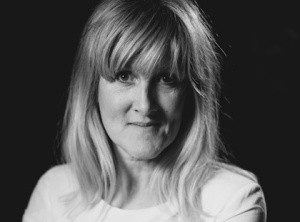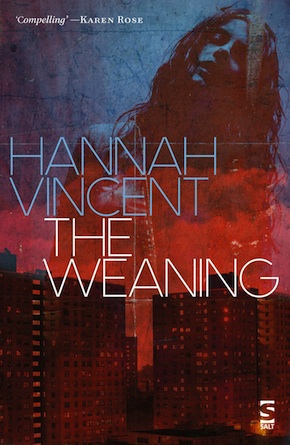Step by step
by Hannah VincentHannah Vincent’s The Weaning is a gripping suspense novel about a psychotic childminder who finds herself the perfect job. But as Bobbi seeks to fill the baby-shaped hole in her life, events spiral out of control. Hannah worked as a childminder while she was writing the novel, and here are her tips for writing from life experience, whether for fiction or autobiography.
1. Write every day – best advice I was ever given. Sometimes it’s not possible so you might miss a day or two but if you leave off midway during a scene where you know what happens next, you can pick it up again as soon as you’re free. Momentum is all.
2. “Write what you know” folk say, to which I reply how could anyone write what they don’t know? (you can try as hard as you like but if your writing’s any good it’s likely to be life writing… Yeah, yeah, yeah you’ve set your novel on Mars and there are intergalactic battles with tentacled monsters… that’s your life right there if you’re doing it right). Knowledge can be deep-seated, instinctive, unconscious, the stuff of dreams. For this reason, I like to write in the mornings, before I’ve read anything or spoken to anyone, preferably, and preferably in bed. This way I can get closer access to what Freud (I think) referred to as the dream state.
3. Why would you want to get up close and personal with your dreams? Because your dreams tell you what is important for you to write about. Sometimes writing can feel hard but when you experience resistance and/or procrastination (the most polite and devious form of resistance) know this, that feeling resistant means you have struck writing gold! If something feels hard or embarrassing or traumatic to write about it’s probably worth writing about.
4. Look after yourself – whether you’re writing about childhood experience in the realist mode or writing fantasy/SF/crime fiction you need to protect the writing and protect yourself. This means:
a) Cultivating an openness – to the world and to words. Don’t think too much about what you’re writing during the first draft, just let your characters present themselves. This means banishing your inner critic (don’t worry, you’ll invite them back later).
b) Investing in nice notebooks if you write longhand and if you’re a straight-to-laptop kinda gal or guy, finding a pleasant writing environment for said laptop (note – ideally this is the fabled ‘room of one’s own’, but not many of us are lucky enough to have such a thing. Bed, then, and for the editing stage kitchen table or desk at your local library or a corner seat in a nice cafe).
c) Cake.
d) Not talking about the writing – you’ll stifle your project at birth if you talk about it too early in the process. No one wants to hear about it anyway, that’s what the writing’s for.
5. Develop a walking habit. This can be helpful if you find it hard to keep up a daily writing routine. Can you walk to work instead of getting the bus? Can you get a walk in on the weekend? Walking is helpful for freeing the mind and achieving something like the dream state when you’re awake – it opens up the unconscious, which is why so many writers find walking helpful for solving structural/plotting problems. When I’m walking I’m writing, too. I always write best when I’m walking, the trick is remembering what I wrote in my head when I reach my destination so that I actually write it down. Carry a notebook if you’re nervous you’ll forget. Alternatively, use the Notes app on your phone.
6. Develop a reading habit. Good writers are good readers too – simple. If you’re too tired to read, can you find an opportunity to listen to quality writing via a podcast or audio book?
You’ve set your novel on Mars and there are intergalactic battles with tentacled monsters… that’s your life right there if you’re doing it right.”
7. Develop a listening habit. If you’re writing from life it might be ‘interesting’ to ask others how they view this or that experience you are writing about. People rarely share the same outlook, and effective writing allows a reader to make up their own mind.
8. Slow down. Writing fast is exhilarating and it can feel less daunting working from a page chock-full of words to remodel and restructure BUT if you write too fast and you don’t edit carefully and ruthlessly there’s a chance some of that crude early material might get left in.
9. Be your own harshest critic. Looking after yourself means not doing that horrible self-censoring thing (“I’m rubbish, everything I write is pants”). This is important while you’re in the first flush of a project but once you’ve got a first draft, leave it a while and then step back in with your tough edity hat on. I cut The Weaning down from 80,000 words to 40,000 – and I really liked the 40,000 words I cut! If I can do it, you can.
10. Find trusted first readers. You’re not going to inflict your first draft (draft zero) on anyone, but once you’ve left it aside and then taken a run at the thing with your filleting knife/sharp pair of scissors then it’s time to be brave and see what someone else thinks. Do you belong to a writing group? Can you afford to spend a few quid sending it to a literary consultancy? Know that the real work of writing is only just starting; but you embrace the hard work of writing, don’t you? Otherwise you wouldn’t still be here. Respect to all you brave and generous folk who are busy finding creative ways to shape your life experiences for others to read about – what you’re doing is incredible, I think.
 Hannah Vincent was born in Canada, grew up in Teddington, studied Drama & English at UEA and gained her MA in Creative & Critical Writing at Kingston University. She is based in Brighton. Her first novel Alarm Girl (2014) is published by Myriad and she has written plays for theatre and radio and worked as a TV script editor. The Weaning is out now from Salt Publishing.
Hannah Vincent was born in Canada, grew up in Teddington, studied Drama & English at UEA and gained her MA in Creative & Critical Writing at Kingston University. She is based in Brighton. Her first novel Alarm Girl (2014) is published by Myriad and she has written plays for theatre and radio and worked as a TV script editor. The Weaning is out now from Salt Publishing.
Read more
hannahvincentinfo.com
@hannahvincent22


